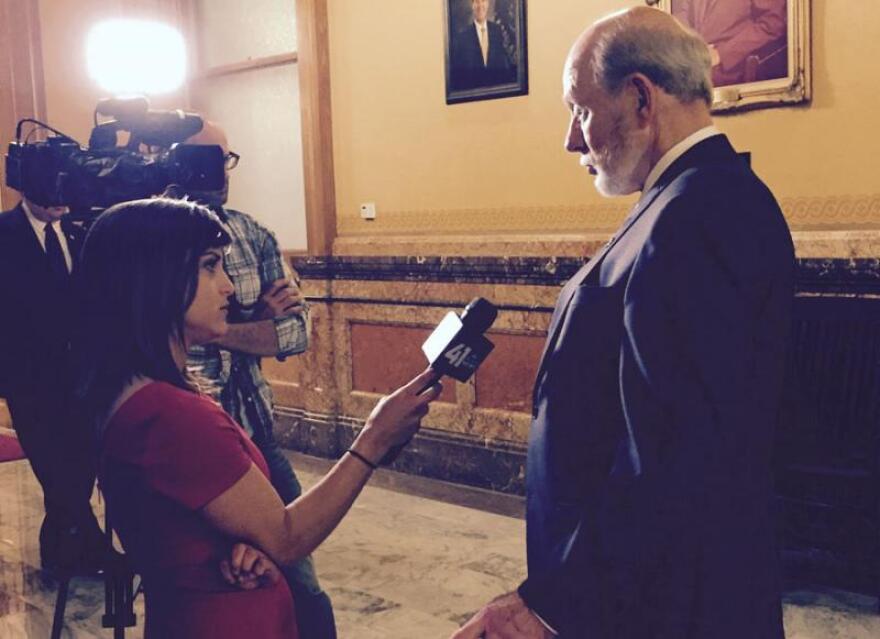The Kansas House could end the longest legislative session in state history Monday by approving a tax plan passed Sunday by the Senate.
The tax plan would generate about $471 million for the budget year that begins July 1, enough to cover a projected deficit and provide a $73 million ending-balance cushion.
“I would hope that we could pass this with a strong vote, strong enough to send a message to the House that says, ‘This is the answer to finish our work this year,’” said Les Donovan, chairman of the Senate tax committee.
Instead, with two senators absent, Republican leaders struggled to get the 21 votes necessary to send the plan on to the House. Sen. Michael O’Donnell, a Wichita Republican, cast the deciding vote, but only after Senate leaders informed him that he couldn’t abstain from voting without permission from his colleagues.
Approval in the House is an open question. The plan doesn’t reinstate taxes on business income exempted by the 2012 tax cuts. Many moderate Republicans and all Democrats in the House strongly favor restoring the tax at the state’s lowest income tax rate of 2.7 percent.
Rep. Mark Hutton, the Wichita Republican leading the effort to reinstate the business tax, said it’s unfair for more than 330,000 business owners and farmers to pay no taxes on pass-through and passive income.
“It’s an equity issue,” Hutton said.
The Senate tax plan freezes individual income tax rates through 2017 to stabilize revenue collections. Starting in fiscal year 2019, it restores but adjusts a complicated formula that would automatically lower rates when revenue grows by more than 3 percent from one year to the next. Many of the moderate Republicans in the House who favor restoring the business tax oppose any further reductions in income tax rates.
Sales tax increased
The Senate-passed plan, like previous versions, relies mainly on the sales tax to raise the revenue needed to balance the fiscal year 2016 budget. It increases the statewide sales tax from 6.15 percent to 6.55 percent.
The increase is expected to generate nearly $188 million in the 2016 budget year before falling to about $113 million in the 2017 budget year, when the rate charged on groceries will drop to 4.95 percent.
During Sunday’s debate, several conservative Republican senators noted the irony that they were supporting one of the largest tax increases in state history.
“We have a reversal of roles going on here,” said Sen. Mitch Holmes, a Republican from St. John. “The party that always wants to raise taxes is sitting back and enjoying the show as Republicans who find taxes repugnant try to figure out how to deal with the situation that we’re in.”
However, Holmes and other conservative senators said a provision in the plan that could lead to the repeal of some sales tax exemptions made it easier to support. The bill sunsets several sales tax exemptions in 2017 and establishes a review commission to recommend which should be permanently eliminated.
“It has been conventional wisdom for the entire time that I’ve been in the Legislature that you can’t remove exemptions,” Holmes said. “This commission is taking that conventional wisdom on by the horns and saying: ‘We’re not going to be afraid of this issue anymore; we’re going to address it.'”
But Democrats said the fact that several “business to business” sales tax exemptions already had been declared sacrosanct and removed from the review list meant that the process would be unfair. Raising the prospect of sales taxes on utilities and gasoline, Sen. Tom Holland, a Democrat from Baldwin City, said the Republicans who voted for the bill could end up being responsible for raising taxes by more than $2 billion.
“If you want to go down this path, go ahead majority party,” Holland said. “Make that sale (to voters). Something tells me it’s going to be a tough one.”
Health advocates disappointed
The tax plan also raises the tax on cigarettes by 50 cents, taking it from 79 cents a pack to $1.29, far less than the increase public health advocates were pushing for.
Erica Anderson, president-elect of the Kansas Public Health Association, said lawmakers missed a chance to save lives — and major taxpayer dollars — down the road by abandoning Gov. Sam Brownback’s proposal to raise the cigarette tax by $1.50 a pack.
“If cigarette taxes go up, but not enough to deter the most price-sensitive customers, Kansas misses a huge opportunity to deter youth from experimenting with these products,” Anderson said.
The $1.50-per-pack cigarette tax increase could have prevented 26,800 people from taking up smoking and helped 24,800 current smokers to quit, according to projections. A higher tax also could have prevented about 4,800 children from being exposed to smoke during their mother’s pregnancies.
Health advocates also were disappointed that the Senate-passed plan uses all of the additional tobacco tax revenue to balance the budget. Earlier versions earmarked some of the money for a tobacco cessation program at the University of Kansas Cancer Center. -



